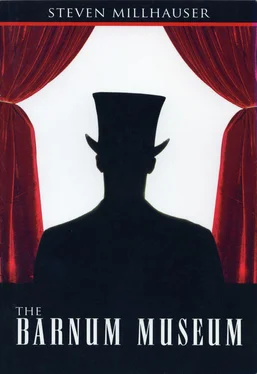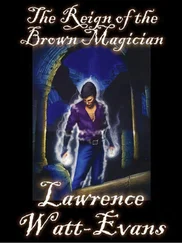I replaced the card against the lamp and tried to nap, but the rain splattering against the windows, and the rattling sashes with the missing lock, and the rattling gray universe, all banished sleep, and I lay with my arm over my eyes waiting for dinner in my darkening room.
Dinner at OCEAN GABLES was served from six to eight. At one minute past six I stepped into the room of small tables covered with fresh white tablecloths and lit by fat candles in colorless glass globes. A small electric heater with a black rubber cord rattled in the center of the room. I wondered what occasion called forth the use of the main dining room and chose a corner table beside a curtained window. As I sat down the woman with sharp elbows appeared in the doorway, wearing a heavy baggy sweater that came down to her thighs and clutching her book against her stomach. She cast an alarmed look in my direction and chose a table in a far corner, where she sat down with awkward suddenness and bent her head over her book. Slowly the other couples came in and took their silent places. “Still raining,” one man said, perhaps to his wife, perhaps to no one in particular, and “Yes,” a woman from another table answered, “it certainly is coming down,” before we subsided into silence. Dinner dazzled us: duck à l’orange with wild rice, hot homemade bread, hot apple crisp for dessert. I lingered over a superb cup of coffee and wondered how on earth I would pass the time till bed. The expression struck me: how on earth. Was it possible I needed some other place? Slowly the room emptied, leaving only me and my destined companion. She had the look of a librarian or a third-grade teacher. We would be married in a white church on a green hill and open a gift shop in Broome. I stared at the bowed top of her head and began counting slowly, but at two hundred thirty she had not looked up. I finished a second cup of coffee and rose, but my fading bride remained rigidly bent over her book. In the living room a number of guests and John Kearns sat on flowered armchairs and couches and watched television. The screen showed rolls of smiling antacid tablets, dancing. Kearns wore a heavy, ribbed sweater and thick shoes with spongy soles; he looked like a happy bear. At the reception desk in the front hall I found a boy of ten reading a toy catalogue open to a page of robots. When I asked about movie theaters he said there was one over in Rock Ridge, at which moment a door opened and Mrs. Kearns came out, holding a tissue to her reddish nostrils and suddenly turning her face away to give a delicate, suppressed sneeze. Rock Ridge was twenty-five miles away through heavy rain. There was a drive-in theater ten miles away but sometimes the bridge was washed out and you had to go through Ashville. I recommended tea with lemon juice and three thousand milligrams of Vitamin C and returned upstairs, where I took a hot bath in a claw-foot tub. In my room I sat in pajamas, shirt, and bathrobe on a hard wooden chair at a small writing table and held my ballpoint poised above the back of a postcard I had found in the drawer, showing on the front a pen-and-ink sketch of OCEAN GABLES. I wrote the C of Claudia , brooded for ten minutes, and went to bed.
Before turning off the lamp I took my sepia postcard from the table and lay holding it upright on my chest. With surprise I realized that I had been looking forward impatiently to this moment, as if in the brown rectangle of the postcard I could forget for a while the rain and the room and the town and my restless, oddly askew life. In the light of the close-pulled lamp the sharpness of the image was almost startling. I could see the needles in the pine trees and the wingtip of a bird on a branch; in a tiny opening in the pines the spotted back of a fawn was visible. I could see the knot in the ribbon in the woman’s hair and the minuscule lines streaming outward from the knot. The hardness of the man’s expression was unmistakable, the tension in lip and nostril sharp and clear. For the first time I noticed that his face was tilted toward hers, which was pulled back slightly, as if from a fire. A long brown cloud was reflected with a single ripple beneath the reflected pines. Uncomfortably I returned the postcard to the base of the lamp and turned out the light.
Perhaps it was the unnatural earliness, perhaps it was the second cup of coffee, perhaps it was only my life, my life, but I could not fall asleep. I listened to the rain, the dark rain of Broome, to the heavy creak and crack of footsteps on the stairs, to the always opening and closing bathroom door — and long after the floor had grown quiet, and I was drifting off to sleep, again I heard the creaking of the stairs as someone climbed slowly, very slowly, pausing as if abashed at each loud crack of wood, until I wanted to shout into the night: and still the steps ascended, timidly, crashingly, and suddenly stopped forever. I fell into a restless sort of half-waking sleep and dreamed that I was wandering ankle-deep in water in a dark tangle of decaying rooms. I came to a massive door with a handle so high I could not reach it. The wood of the door was slippery and covered with greenish slime, and when the door sprang open I saw Plumshaw before me, but she was grinning wildly and her hair was blowing in the wind. I turned over and Plumshaw vanished but the rooms remained, filled now with small tables heaped with bowls of soup. Claudia was complaining about the soup, knocking one bowl after another from the tables, and when I crouched down to pick up a bowl I saw a woman seated on the floor with her head bowed, who looked up with startled eyes as I woke in the dark. My windows were rattling. I turned on the lamp. It was 11:46. Grimly I threw off the covers and marched to the writing table, where I folded the OCEAN GABLES postcard in half and in half again before thrusting it between the clattering pair of unlocked sashes. Back in my bed I lay in lamplight listening to the rain. As I turned on my side and reached up to turn off the lamp I glanced at the postcard.
There was no possibility of misreading their expressions: she was in anguish, his face was twisted in anger. The dark sun seemed to have slipped lower, it was barely visible above the pines. His body leaned harshly toward her and she was straining away. The dark brown sun half-sunk behind the trees, the unpeaceful lovers, the sharp rocks, the brown clouds, all were burdened with sorrow, and with a sense of oppression I thrust the picture back against the lamp.
I must have fallen into a light, uneasy sleep, for I was wakened by what sounded like a faint gasp or cry. I lay listening, but heard only the harsh rain. In that black room my chest felt heavy, my lungs labored, I could barely breathe. With a feeling of anxiety I sat up and switched on the lamp, which instantly sprang up in a black window. I snatched the postcard and looked in anguish at her face stricken with terror, his face taut with fury. A tendon stood out sharply on his neck and I saw that his slightly raised right hand grasped a small sharp rock. I could see the tense knuckles and the tiny, carefully manicured nails.
I tore my eyes away and saw on the lamp table the small, flat paper bag. Quickly I thrust the postcard into the bag.
I turned off the lamp and could not sleep. The oppressive postcard, the clattering rain, the labyrinth of tangled bedclothes, my racing mind, all lashed me into heavy wakefulness. Sometime in that hellish night I heard a dim cry, a thud, a splash, but I was sick to death of Broome, I was sick to death of it all, and lay with clenched fists in the streaming dark, imagining the bloody stone, the circle of spreading ripples, the floating hair. Toward dawn I slept, and was wakened not long after by the banging of the bathroom door.
I was the first one down for breakfast, and I rose wiping my lips as two silent couples were studying the menu. Through the cold morning rain I made my way down the steep street, leaning forward in the wind and holding my umbrella with two hands, one on the curving handle and one under the spokes. Though it was ten of eight, Plumshaw was there. I had known she would be. The look she gave me, when I entered under the tinkling bell, seemed to say: no returns accepted. I balanced my dripping umbrella carefully against the counter and strode toward the passage as the handle began to slide in a dream-slow arc. In the warren of rooms and passages I lost my way and came to a room filled with old furniture: a flattish rolled-up carpet lay bent across an armchair, and a dressmaker’s dummy, wearing nothing but a wide-brimmed black hat, rose up from behind an upside-down bicycle. After that I found myself in a room with a boarded-up window, and then I stepped through a narrow passage into the room with the rack of postcards. At the table I kept looking at the entrance, but Plumshaw didn’t appear. Furtively I pulled the paper bag from my pocket and slipped out the postcard, pausing for an instant before thrusting it into the middle of a cluster of cards. In that pause I glanced at it, but in the poor light I saw only a vague brown scene, with something dim, perhaps a figure, at the end of the rocky point. Wildly I spun the teetering rack and turned away. At that moment I was seized by a violent curiosity, like a hand gripping my throat, and stepping back to the rack I began searching desperately through postcards of baroque fountains and Alpine huts and old railroad trains. It was Plumshaw who saved me: she walked into the room and I whirled around. She was carrying a shoebox under one arm.
Читать дальше












